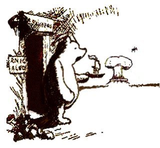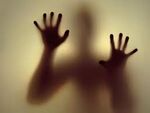The powers that be
The powers that be are the forces that decide how a government, society, or economy shall operate. As opposed to, say, a Parliament or Congress or courts or stuff. In other words, powers that be in conversation is your clearest rhetorical hint that your companion has no flippin' clue as to how things really work.
Conventional wisdom[edit]
In the minds of people who go around talking about the "powers that be," the only power they know about is the chief of state: the President or Prime Minister, and then only if he has been on television in the past week. The powers that be make decisions by setting out rules and regulations. The people who talk about rules and regulations do not know the difference between a rule and a regulation, nor know how either come to be or where you'd go to read one. But suddenly, the wrong people are in jail and the only thing that folks are buying is pet rocks. Perhaps the powers that be dispense with laws entirely, and toss people in jail and stock the shelves themselves.
It takes unbelievable stupidity to think that everything that is, is a result of a decision, and that all decisions are made by the same outfit — namely, the powers that be — except that it becomes less unbelievable once you start talking with the guy sitting on the adjacent bar stool.

The common man who speaks of the powers that be understands that he doesn't know much, but unfortunately is totally ignorant of what he needs to find out. It was Donald Rumsfeld who fitted together the conundrum that often "We don't know what we don't know."[1] Sadly, this made him one of the powers that be, meaning that he had to be quickly drummed out of the U.S. Government. He was too smart to serve; everyone knows that the powers that be aren't very smart. That would imply that the way things work was semi-sensible.
Oddly, people living under something other than a President or PM do not talk about the powers that be. Citizens of North Korea or Iran do not mention some shadowy cabal that makes all the important decisions in the country. They know exactly who makes the decisions — and that it's prison if you joke about him. Citizens of Hong Kong would be justified in talking about the powers that be, whether it's their "elected" government or the bureaucrats on the mainland who can extradite them for "trial" if they actually exercised those powers.
Origin[edit]
Wikipedia tells us that "the powers that be" is an example of "idiomatic" English. Idiomatic English is that English spoken by idiots. After all, real English is "the powers that are." However, the powers that be do not even permit the certainty that they exist. So they have even bricklayers speaking in the subjunctive case.
It was William Tyndale who first wrote in 1526 that, "The powers that be, are ordained of God." This is quite different from its modern usage, as Tyndale had a clear vision of what he was writing about, whereas now, no one who talks about the powers that be even tries to flesh it out.
In 1621 in Plimoth Plantation, the Pilgrim Hendiadys promulgated the first "rules and regulations." Though he must have been among the powers that be, his wordsmithing was followed only in the breech, as he could not spell worth crap.
History[edit]
The American Founders wrote that "Congress shall make no law" that purported to do certain things. Here we get a whiff of powers-that-be ideology. How could the Founders not know that what Congress does is enacts law, which the President then signs or returns to the Congress with his objections, etc., etc.? But this can be excused. In the first place, the best governance the Colonies had had was when the powers that be strapped a spinster to her washboard and threw her into the river to see if she would float, which meant she was a witch and had to be killed. In the second place, the Founders were in the midst of defining all that enactment stuff, and ought to be forgiven for briefly glossing over it with a bit of hand-waving.
African Americans often get at the same idea when they talk about "Smilin' faces" or "the Man." This represents the powers that be. However, these speakers are certain of one aspect of the powers that be: white skin. The people who run the world are lily-white. It is they who put Barack Obama in the Oval Office and LeBron James on the hardwood, in preference to all the crackers who competed against them. Lifting up a brotha was a mere gambit to keep y'all down.
They don't want you to know[edit]
Above all, the powers that be try to keep you in the dark. Much of their power would dissipate if you simply caught on. This means that the very most effective sales pitch[2] is that the advertiser has information that "they" don't want you to know. You can send away for a free pamphlet with all these self-help secrets and infuriate the powers that be. In fact, the powers that be don't care, but the advertiser now has you on a gigantic list of people who respond to advertising, are utterly senseless, and feel helpless — perfect marks for a variety of future frauds.

